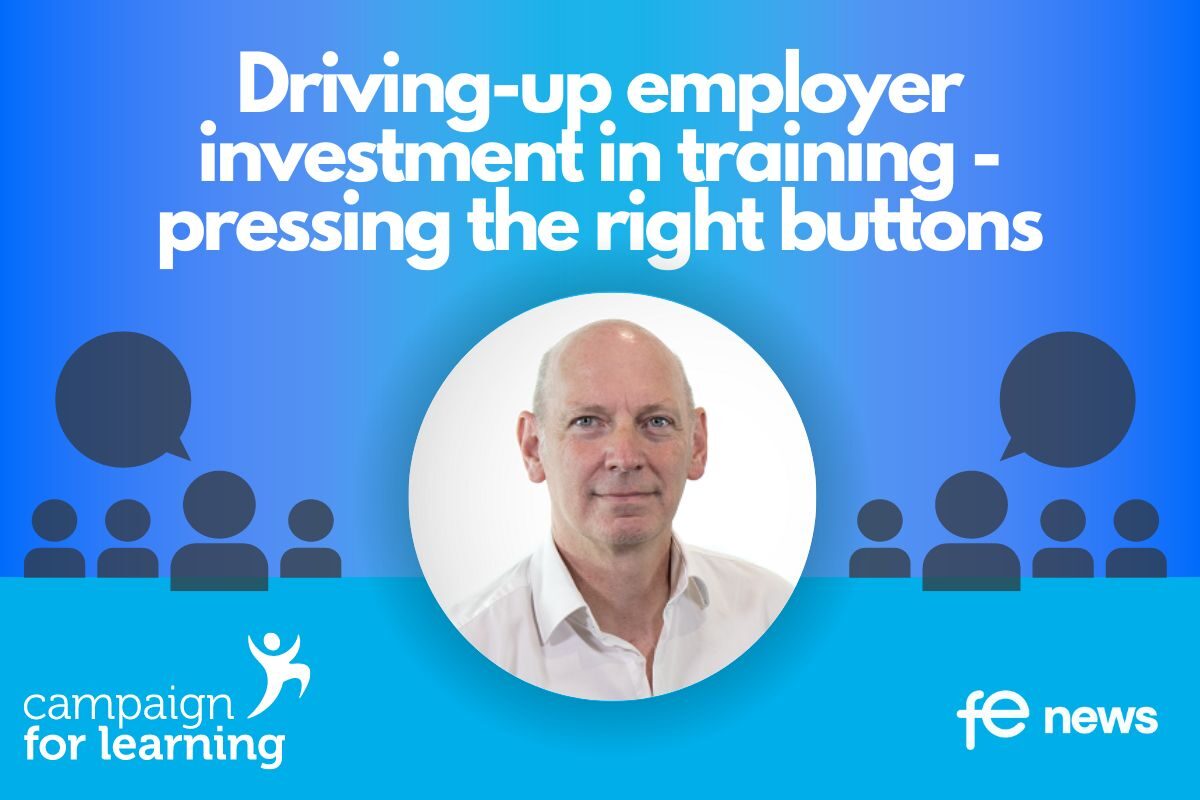Increasing employer investment in training

With 80% of the 2030 workforce already in work, getting workplace training right, including upskilling and re-skilling, has never been more important.
The UK underperforms when it comes to technical skills. Government spending is predominantly on apprenticeships and has faced significant decline since the 2000s. While business is taking steps to address skills gaps and market failures, more can – and should be done – to reskill and upskill workers.
The CBI’s Education and Skills Survey (2023) has revealed several interesting trends on this topic.
Fewer businesses are investing in adult education and lifelong learning
Concerningly, more respondents to this year’s CBI survey stated that their organisation has not invested in adult education and lifelong learning in the past five years, with 17% of respondents indicating no investment compared to 9% in 2021.
When asked, businesses said that the main barriers they face in meeting their skills needs is accessing adult education. The top answer selected by employers was a lack of suitable, high-quality provision available locally, which was chosen by 35% of respondents.
Nearly a third of respondent firms (32%) identified a lack of funds and the prohibitively high cost of training is amongst their key barriers, and the same proportion (32%) cited challenges in sparing time for employees to attend training.
There was also a widespread lack of awareness of key government skills reforms aimed to engage businesses. 82% of respondents said they had little or no awareness of the Local Skills Improvement Plans (LSIPs), and 4 in 5 respondents had little or no awareness of the Lifelong Loan Entitlement that is pencilled in for 2025.
Businesses are adopting a hybrid approach to staff training and development
Businesses have adopted a mix of online and in-person training and development over the past year. 43% of respondents reported an increase in their use of on-the-job training, compared to just 1% reported a decrease.
Short courses have become a more popular form of training, with 26% of respondents increasing their use in the past year, compared to 4% who reported a decrease. The popularity of short courses chimes with insights from CBI members about the value of shorter, responsive forms of training to enable employees to top up their learning and address skills gaps as they arise.
Firms are uncertain about the sufficiency of training budgets to solve skills shortages
Respondent firms indicated that they agreed that their organisation analyses current skills gaps before setting training budgets. Just 5% strongly disagreed in their answer.
However, there was a high degree of uncertainty amongst respondents in answer to the question as to whether they felt their training budgets were sufficient to solve skills shortages, with one in three (34%) neither agreeing nor disagreeing.
Training budgets often seem to be one of the first lines to be cut when finances are tough. It is almost a cultural issue in the UK that we do not invest enough, we do not prioritise enough, training for our current and future workforce.
If we are to boost the UK’s productivity and remain internationally competitive, there will need to be a step up from both business and government. The evidence points to five principles for future skills policy to ensure it remains appropriate for the future of work and creates an environment in which employers feel confident in investing more in training and to address the cultural change in attitudes to training that is required.
Five principles of the labour market
We need to ensure training is responsive to rapidly changing skills need. With skills changing so rapidly, there is a need for workers to keep topping up with new skills, which requires more flexible and modularised training options.
Training solutions must be broadened out beyond just apprenticeships. Apprenticeships are part of – but not the entire – solution. Fulfilling the UK’s upskilling needs requires a broader mix of training solutions. The Apprenticeship Levy is an example of the lack of flexibility in the system.
The focus must be on productivity enhancing skills including digital skills and green skills. Skills demands of the future are changing the nature of work. There is an imperative to focus on increasing the UK’s skills base in areas of future skills if the UK is to bridge the current innovation gap with other countries.
We must also address cost barriers to skills investment, particularly for SMEs. Cost is often cited as the largest barrier to skills investment for firms, and this is exacerbated for SMEs who lack the scale and capacity to engage in workforce training. Government can do more to change the scope of eligible R&D spending, or adjust the extent of tax deductions, to incentivise investment in training.
And we must monitor skills gaps across the economy swiftly to minimise their impact. With technology changing so rapidly, it will be important to ensure skills gaps are identified at the earliest possible opportunity, so that these can be addressed at pace.
Recommendation 1
The Government must flex-up the apprenticeship funding system in England.
Recommendation 2
Funding from the levy should be used to finance a broader mix of training.
Recommendation 3
Across the post-18 education and training system, we need to embrace modularised training provision.
By Robert West, Head of Education and Skills, CBI
This article is part of Campaign for Learning’s series: ‘Driving-up employer investment in training – pressing the right buttons’.
Part One: Employer investment in context
- Louise Murphy, Economist, Resolution Foundation: Investment in the round
- Dr Vicki Belt, Deputy Director, Enterprise Research Centre, Warwick Business School: UK enterprises and investment in capital and training
- Becci Newton, Director, Public Policy Research, Institute of Employment Studies: Employer investment in training in England
Part Two: Drivers of employer investment in training
- Neil Carberry, Chief Executive, Recruitment and Employment Confederation: Derived demand, British management and employer investment in training
- Ewart Keep, Professor Emeritus, Education Department, University of Oxford: Strategies to drive-up employer investment in training
- Sam Alvis, Head of Economy, Green Alliance: Transitioning to net zero, green skills and employer investment in training
- Dan Lucy, Director of HR, Institute of Employment Studies: Job quality, job design and driving-up employer investment in training
- Natasha Waller, Policy Manager, LEP Network: Local inward investment, business support and employer demand for training
- Jovan Luzajic, Acting Assistant Director of Policy, Universities UK: Universities, R&D, business innovation and meeting employer skills needs
- David Hughes, Chief Executive, Association of Colleges: FE colleges, business innovation and meeting employer skills needs
Part Three: Increasing employer investment in training
- Paul Bivand, Labour Market Consultant: Why should employers invest in training in a flexible labour market?
- Aidan Relf, Skills Consultant: Why should employers invest in training with large net worker migration into the UK?
- Stephen Evans, Chief Executive, Learning and Work Institute: Raising employer investment in training
- Robert West, Head of Education and Skills, CBI: Increasing employer investment in training
- Lizzie Crowley, Skills Policy Adviser, CIPD: Encouraging employer demand for training
- Anthony Painter, Director and Daisy Hooper, Head of Policy and Innovation Chartered Management Institute: Increasing employer demand for management training
Part Four: Raising employer demand for publicly funded post-16 education and skills
- Jane Hickie, Chief Executive, AELP: Increasing employer demand for post-16 apprenticeships in England
- Mandy Crawford-Lee, Chief Executive, UVAC: Increasing employer demand for level 4-5 technical education in England
- Ian Pryce, Principal, The Bedford College Group: Increasing employer demand for higher technical education in England
Part Five: Raising employer demand for work placements
- John Widdowson, Board Member, NCG: Increasing employer demand for work placements for level 3-5 vocational courses in England
- Stephen Isherwood, Joint Chief Executive, Institute of Student Employers: Increasing employer demand for undergraduate work placements in England











Responses